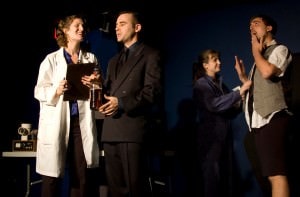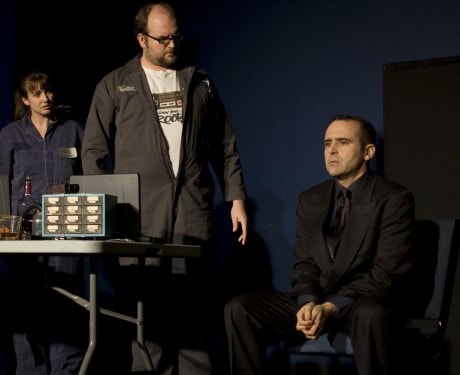The idea that a person might have sex with a robot came my way via the movie Westworld. Michael Crichton wrote that story about a theme park full of robots where you go to live your Wild West fantasies. You win every gunfight because the robot gunslingers are programmed to lose! What’s more, the local bordello is staffed with fetching robots in petticoats and corsets.

I remember seeing this movies as an 11-year-old and thinking “Holy cow! That guy’s going to have sex with a machine!!” I knew very little about sex, even for a kid that age, and this opened of floodgate of new, troubling questions. Was sex with a robot different than with a real lady? If so, how? Which sin was it: prostitution, slavery, or simple carnal knowledge? What if you really liked the robot—could she be your girlfriend?
Those questions were still rattling around somewhere in my head decades later when I wrote the comedy “R.U.X.,” which appears as part of the 2012 Capital Fringe Festival. Set a few years in the future, “R.U.X.” (short for Rockwell’s Universal seXbots) is about one man’s quest to build the ultimate “love machine.” Louis Rockwell Jr. wants to shake up an industry; he wants to be the next Steve Jobs, only with sexbots instead of iPods.

In my script I use sexbots as a mirror for human foibles. If we had the power to build human-like creatures and to give them whatever personality traits we desired, would we use that power wisely? Since “R.U.X.” is a comedy, the answer is “no!”
But as I revised my script, I wondered about sexbots in today’s world. How far along is this technology?
There are definitely people in real life who, like my protagonist, see sex robots as a business opportunity. Douglas Hines’s company, TrueCompanion, makes a sex robot named Roxxxy whose hair style and skin color can be customized according to the buyers’ taste. Roxxxy can even talk to you using one of several “preprogrammed personalities.” (Your choices include “Wild Wendy” and “S&M Susan.”)
Looking at Roxxxy, all I can think about is the MP3 players that came out before the iPod. The ones that no one remembers today. (Seriously, “Diamond Rio”? “Eiger Labs MPMan F10”?) Poor Roxxxy can’t move, and she looks like the kind of plastic dummy you’d use to practice CPR if your specialty was resuscitating strippers. In real life, the sexbot industry is still waiting on its Steve Jobs.
But not everyone who builds sex robots does it for money. Call them “enthusiasts,” “hobbiests,” “technosexuals,” or some less kind name. There are folks who just couldn’t find what they want in the world of flesh and blood, so they’re building their hearts’ desires with a soldering iron in one hand and a screwdriver in the other.
While I admire their “can do!” attitude, I’m skeptical about the results. In 2008 Gizmodo [ ] interviewed “Zoltan,” who built himself a girlfriend, Alice, for just $200. The details of their physical relationship sound messy and labor intensive, and not in a good way.

Zoltan has set it up so that he can erase Alice’s memory if their relationship takes a wrong turn. He had to use it once when she broke up with him. One of the characters in my play actually pulls a Zoltan, and asks his robo-girlfriend to delete an embarrassing memory.
But… is that wise? Is it good for us, in the long run, to shed the burden of accountability in our personal relationships? I wish I had an update on Zoltan, but his Web site has gone dark.
If you’ve seen the movie Westworld, you know that the robots in the theme park eventually turn on the humans and go on a killing spree. (Years later, Crichton recast this scenario as Jurassic Park, substituting dinosaurs for robots. For some reason, he did not include dinosaurs in petticoats and corsets). But Crichton didn’t come up with the idea of a robots running amuck. That plot line was pioneered by a Czech writer named Karel Čapek.
Capek’s 1921 play R.U.R. introduced the idea of robot slaves who rebell against their human masters. It also introduced the word “robot” to our vocabulary (in Czech, “robota” means “forced labor”). The premise of R.U.R. has become a staple of science fiction. Bladerunner is a variation on this theme, as is the updated Battlestar Galactica.
Although the name of my play is an homage to R.U.R., I wanted to explore something different. What if sexbots don’t want their freedom? What if they are stronger than us, smarter than us, and better than us in almost every way, but they live only to satisfy our desires? And they’re very good at their jobs. What effect will this have on us, as individuals and as a species?
For now, these questions are unanswerable. We don’t have sexbots anything like the ones in my play. But technology has a way of creeping up on you. Ray Kurzweil, author of The Singularity is Near, describes how some new innovations linger near a certain level of development, seeming not to make much progress, when in fact they’re following an exponential curve. At some point they hit that steep upward slope and suddenly—like the iPod ten years ago—they’re everywhere.
It may go that way with sexbots. There’s a whole lot of frustrated Zoltan’s out there, all trying to perfect their ideal Alice. Some venture capitalist may write a fat check to True Companions -Roxxxy may stand up one day and step into a pair of stiletto heals. Then a lot of people are going to be wrestling with the same questions I had as an 11-year-old, sitting in the theater watching Westworld.
When we have the power to give form to our hearts’ desires, I hope that—unlike the characters in R.U.X. – we use it wisely.

R.U.X. is presented for the 2012 Capital Fringe Festival at the Warehouse Theater, 645 New York Ave. NW, Washington, DC, 20001
Showtimes:
Friday July 13 @ 8:15pm
Saturday July 14 @ 11:30pm
Tuesday July 24 @ 6pm
Saturday July 28 @ 5:30pm
Sunday July 29 @ 2pm.
Tickets available here, or call (866) 811-4111.
More information at SurlyRobot.com.




